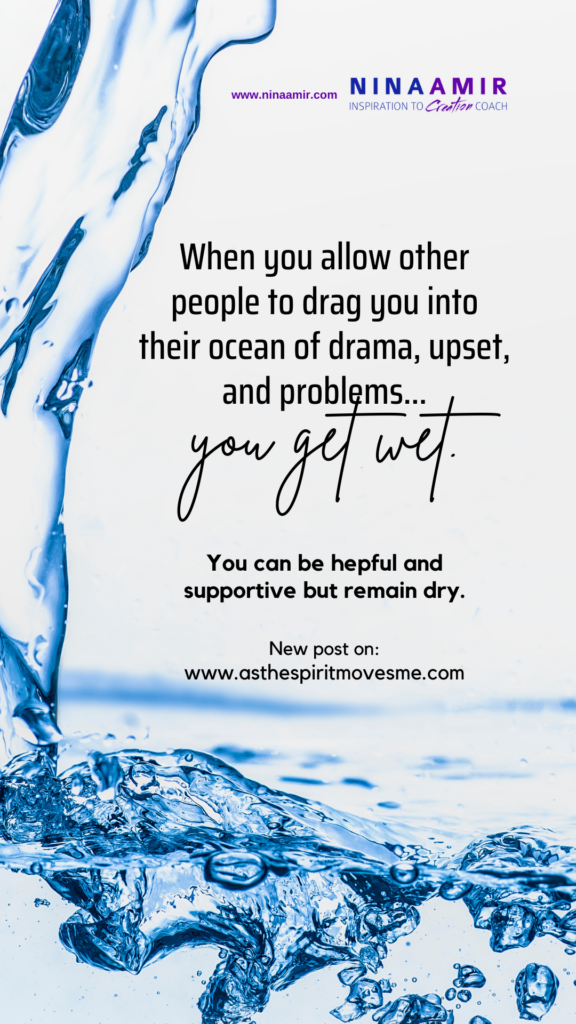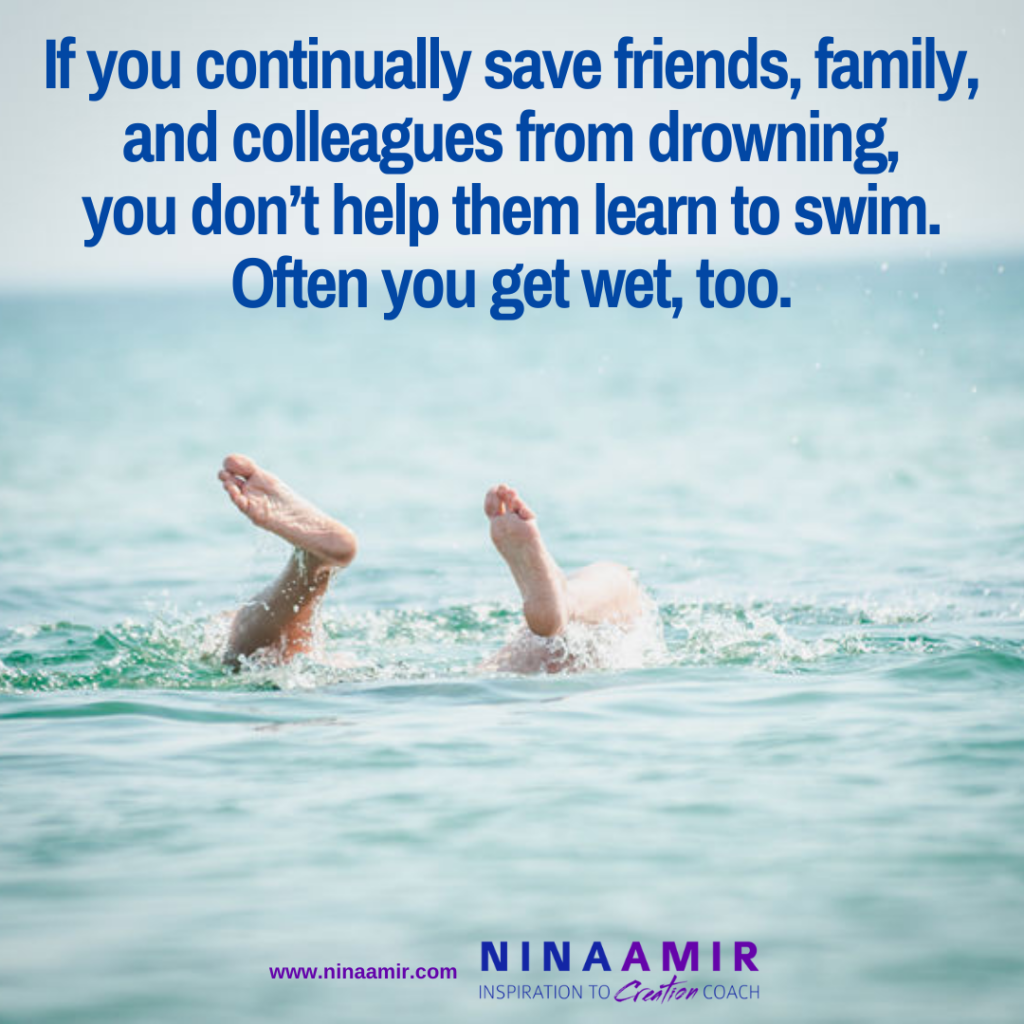Staying out of other people’s dramas, upsets, and problems can prove challenging, especially for compassionate and caring people who want to help others. However, it is vital to strike a balance between being there for friends, family, acquaintances, or colleagues and protecting your mental and emotional health. If you fail to do so, you’ll get pulled into the water with them.
The same can be said of watching the news. You must balance between wanting to know what is happening in the world, trying to make a difference, and maintaining your mental and emotional health. If you don’t, you’ll likely feel as if you are drowning.
My mentor, Jim Fortin, likes to share some advice from his brother-in-law, a shaman. He says, “If you don’t want to get wet, stay out of the water.” This guidance applies to the scenarios posed above or any others that have the potential of sucking you into other people’s sea of dramas, upsets, negativity, or problems.
Staying Dry
I have thought about not getting wet—or staying dry—a lot lately. I’ve been navigating some drama between a few of my friends. And I didn’t want to find myself up to my chin in the emotional flood waters.
In other words, I didn’t want to be sucked into their stories or emotions and be upset, too.
Recently, another friend came into a room stressed to the max. I really didn’t want to become soaked in her turmoil and overwhelm.
In the first case, I tried to be supportive in text stream and on a few phone calls. But, at the end of the day, I felt like I’d swum across the English Channel. In the second case, I didn’t engage or try to reduce her upset. Thus, I remained dry and with my energy intact.
Choose Not to Get Wet
The trick is to stay dry always, though. For that to happen, you must consciously choose not to get wet. Then, do whatever is necessary to keep that commitment to yourself.
Often, accomplishing that feels easier said than done.
With that in mind, I’d like to propose five ways not to get wet the next time you see yourself heading for someone else’s turbulent water.
How to Stay Dry
1. Don’t take on other people’s issues as your own.
It is natural to want to help your friends, family, and loved ones when they go through tough times. Yet, it is essential to remember that you are not responsible for their problems.
Also, the only way they learn whatever lessons they need is by taking responsibility for themselves. If you “save” them, that won’t happen. So instead, encourage them to take responsibility so they stand in their power and find solutions.
2. Practice active listening.
One of the best ways to help someone is to listen actively. Active listening involves paying attention to what the person says, giving them your full, undivided attention without interrupting or judging them.
Active listening helps the person feel heard and supported—and you think you are helping somehow. However, you avoid taking on their issues because you don’t offer help or commiserate with them.
When a friend asks to speak to you about the drama or emotional situation currently in their life, don’t try to solve their problems. Instead, focus on understanding their perspective and letting them know you are there for them.
3. Set boundaries.
Setting healthy boundaries is one of the most effective ways to avoid other people’s problems and drama. However, you must be clear about when to pull back and care for yourself. With that awareness, you can set an appropriate boundary.
 Sometimes, declining an invitation to talk about your friend’s problems is necessary because you know it will impact your well-being. This is especially true if you know speaking with them will drag you into the raging water with them. By that, I mean you have past experience that proves you end up feeling upset, anxious, or in some way like it’s your job to fix whatever is wrong in their life—and you know you’ll feel guilty if you can’t do that.
Sometimes, declining an invitation to talk about your friend’s problems is necessary because you know it will impact your well-being. This is especially true if you know speaking with them will drag you into the raging water with them. By that, I mean you have past experience that proves you end up feeling upset, anxious, or in some way like it’s your job to fix whatever is wrong in their life—and you know you’ll feel guilty if you can’t do that.
Boundaries help you prevent yourself from psychologically or mentally draining situations. Consider boundaries like erecting a healthy wall or space between wanting to help and taking on other people’s issues as your own.
4. Offer support, not solutions.
When it comes to your friends, family, or work associates, providing too much support can do more harm than good, particularly if it becomes a caretaking arrangement. Instead, offer emotional support and help them realize they have the resources and skills necessary to solve their problems. Then, encourage them to do just that.
Help them see their strengths and abilities rather than trying to fix everything for them. Otherwise, you’ll find yourself constantly saving them—and getting drenched in the process.
5. Don’t get in the middle.
There is one boundary you can set before anyone asks for your help—or you feel like you should give it: Don’t get in the middle. Actually, I’d make this a firm rule. That means you don’t try to fix a problem between two or three (or more) people. Instead, you let them solve it themselves.
Additionally, this means no sharing what one person said with the other. In other words, don’t gossip…even if you think you are doing it to help.
Gossip often provides a way to discuss a conflict, first with one person, then with another. But it ends up being a “he said, she said” conversation. And, since you are talking about one person or another behind their back, it’s a surefire way to get really wet.
Even though you may have good intentions, putting yourself in the middle of other people’s conflicts often causes more drama and stress within their lives—and yours. And often, this type of intervention backfires and creates discord between you and the other parties, too.
Make it your firm policy not to engage in any type of gossip. For example, if someone starts to gossip about someone else’s situation or what someone did, politely decline to participate in the conversation.
Getting Wet Leads to Codependency
Staying out of other people’s problems means acknowledging the line between caring and codependency. If you continue to jump into the water to save friends, family, and colleagues from drowning, you don’t help them learn to swim. And they will then habitually call on you to throw them a life vest.
Ultimately, you must balance your sensitivity and compassion with personal boundaries and realistic expectations for yourself and others. Stand in your power and stop trying to be the savior.
Remember the airplane advice: In an emergency, put on your oxygen mask first so you can help others put on theirs. Your primary job is to be responsible for yourself. Stay centered, connected, and focused on your well-being and happiness, even if that seems selfish. And know you can help people by role modeling responsibility, boundaries, and caring without getting emotionally involved.
Think of yourself like a duck. Let the water run off your back. Better yet, never dip your toes in the water.
How do you avoid getting sucked into other people’s dramas, upsets, and problems—even when you want to help? Tell me in a comment below. And please share this post with a friend or on social media.
If you want to increase your ability to create desired results—like helping others without needing help as a result, let’s chat. Get on my calendar here. Or join the Inspired Creator Community for group personal and spiritual growth coaching every month. It’s in this community that real transformation happens…
 It’s time to transform, is it not? Join the Inspired Creator Community. As a member, you will discover how to change from the inside out. Finally, be the person who does the things that allow you to create what you desire. Gain access to intuitive transformational coaching, world-class Certified High Performance Coaching, and strategies for living a life that feeds your soul. As you will discover, you are a powerful creator. It’s time to create what you want. Join now!
It’s time to transform, is it not? Join the Inspired Creator Community. As a member, you will discover how to change from the inside out. Finally, be the person who does the things that allow you to create what you desire. Gain access to intuitive transformational coaching, world-class Certified High Performance Coaching, and strategies for living a life that feeds your soul. As you will discover, you are a powerful creator. It’s time to create what you want. Join now!Photo courtesy of galka3250 .



